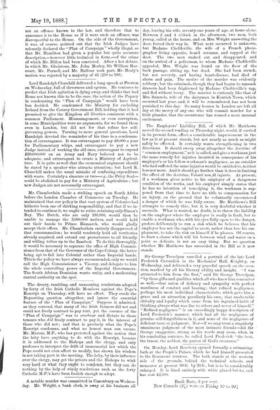The Employers' Liability Bill, of which Mr. Matthews moved the
second reading on Thursday night, would, if carried in its present form, effect a considerable improvement in the law as it at present stands, but not nearly as much as might safely be effected. It certainly wants strengthening in two directions. It should sweep away altogether the doctrine of "common employment," as it is called, and give a workman just the same remedy for injuries incurred in consequence of his employer's or his fellow-workman's negligence, as an outsider who had suffered the same injuries would be entitled to, neither less nor more. And it should go further than it does in limiting the effect of the doctrine, Volenti non fit injuria. At present, if a workman gives notice to his employer of a dangerous condition of the works, and his employer simply states that he has no intention of remedying it, the workman is sup- posed from that time to have no title to compensation for an injury, on the ground that he voluntarily encountered a danger of which he was fully aware. Mr. Matthews's Bill attempts to remedy this ; but it is very doubtful whether it succeeds. What is wanted, no doubt, is to throw the liability on the employer where the employer is really in fault, but to enable a workman who, with his eyes fully open to the danger, prefers deliberately to run a risk which he believes that his employer has not the capital to avert, rather than lose his em- ployment, to take the risk on himself if he pleases. Of course, to draw a clause which will hit between wind and water on a point so delicate, is not an easy thing. But we question whether Mr. Matthews has succeeded in the Bill as it now stands.


































 Previous page
Previous page